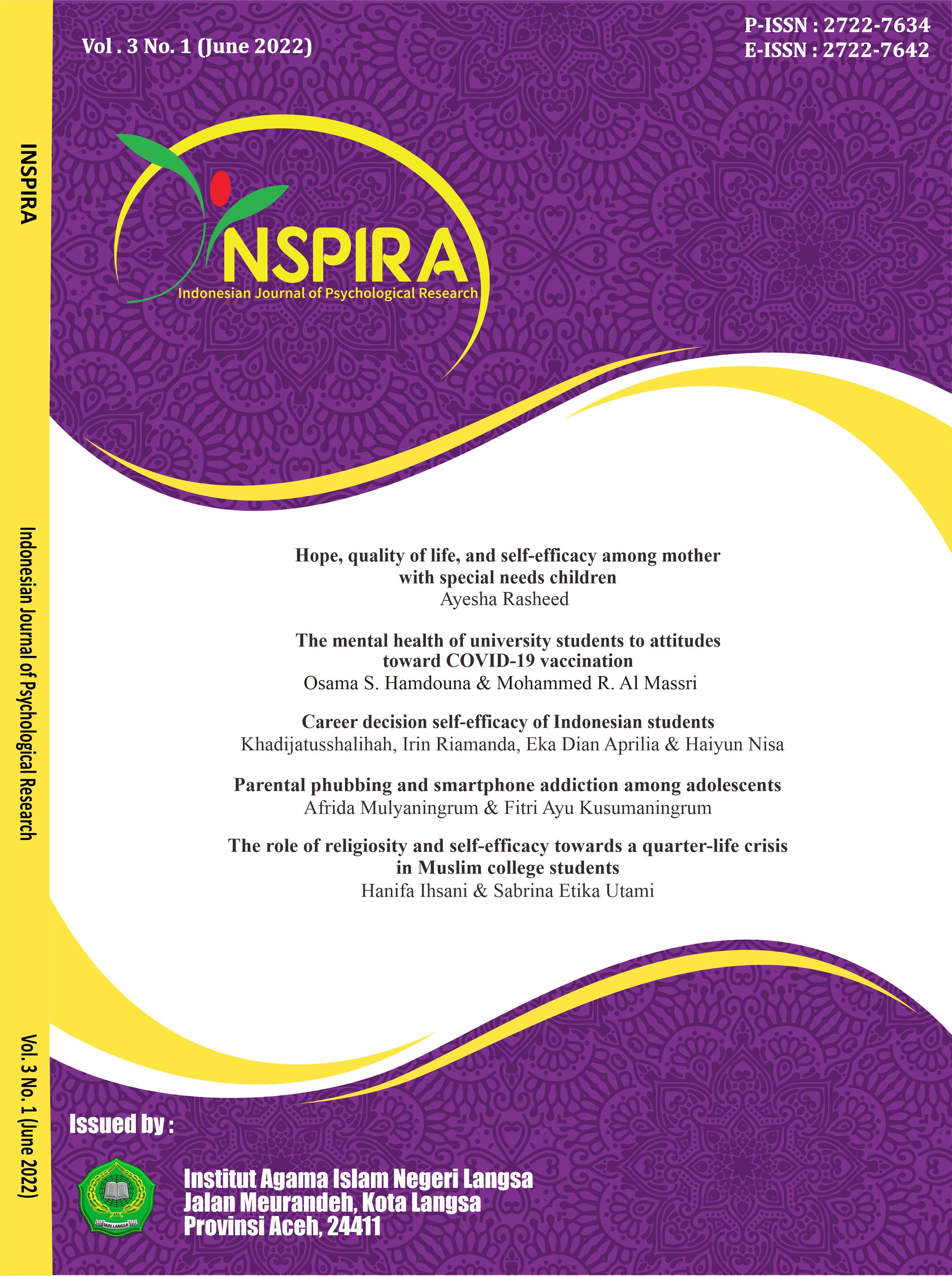Main Article Content
Abstract
Early adulthood is one of the crucial moments of an individual's life since it marks a person's thinking seriously regarding the future, especially in careers. An individual will firstly make a series of career decisions before choosing a career. Self-efficacy is the best predictor of students' academic and social integration. This study used a quantitative method with a descriptive analysis approach to describe and identify the status of career decision-making self-efficacy students in preparing for career decisions. Participants of the current study were 196 students from different backgrounds such as genders, choice of majors, domiciles, and types of accommodation. Participants were selected using a simple random sampling technique. The instrument used is Career Decision Self Efficacy. The findings revealed that 70.9 % of the students are in a high level of Career Decision Self Efficacy (M= 98.9), and there were no differences in Career Decision Self Efficacy among students reviewed based on genders, and choice of majors, domiciles, and types of accommodations.
Keywords
Article Details

This work is licensed under a Creative Commons Attribution-NonCommercial 4.0 International License.
Authors who publish with INSPIRA: Indonesian Journal of Psychological Research agree to the following terms:
- Authors retain copyright licensed under a Creative Commons Attribution-NonCommercial CC BY-NC 4.0, which allows others to remix, tweak, and build upon the authors' work non-commercially, and although the others' new works must also acknowledge the authors and be non-commercial, they do not have to license their derivative works on the same terms.
- Authors are permitted and encouraged to post their work online (e.g., in institutional repositories or on their website) prior to and during the submission process, as it can lead to productive exchanges, as well as earlier and greater citation of published work (See The Effect of Open Access). In other words, authors can archive pre-print (submitted version), post-print (accepted version), and publisher's version/PDF.
References
- Azwar, S. (2013). Metode penelitian. Pustaka Pelajar.
- Bandura, A. (1997). Social learning theory. Prentice-Hall, Inc.
- Betz, N. E., Klein, K. L., & Taylor, K. M. (1996). Evaluation of a short form of the career decision-making self-efficacy scale. Journal of Career Assessment, 4(1), 47–57. https://doi.org/10.1177/106907279600400103
- Chaney, D., Hammond, M., Betz, N., & Multon, K. (2007). The reliability and factor structure of the Career Decision Self-Efficacy Scale-SF with African Americans. Journal of Career Assessment, 15(2), 194–205. https://doi.org/10.1177/1069072706298020
- Damayanti, D., & Widyowati, A. (2018). Peningkatan Career Decision Making Self Efficacy (CDMSE) melalui pelatihan perencanaan karir pada siswa SMK. Humanitas, 15(1), 35–45. https://doi.org/10.26555/humanitas.v15i1.7409
- Dharma, G., & Akmal, S. (2019). Career decision making self-efficacy dan career indecision pada mahasiswa tingkat akhir. Seurune Jurnal Psikologi Unsyiah, 2(2), 1-19. https://doi.org/10.24815/s-jpu.v2i2.14203
- Firdaus, W., & Arjanggi, A. (2020). Self-efficacy and career decision making difficulties in senior high school students. Indigenous: Jurnal Ilmiah Psikologi, 5(2). 141–150. https://doi.org/10.23917/indigenous.v5i2.8941
- Fukuyama, M. A., Probert, B. S., Neimeyer, G. J., Nevill, D. D., & Metzler, A. E. (1988). Effects of DISCOVER on career self-efficacy and decision-making of undergraduates. The Career Development Quarterly, 37(1), 56–62. https://doi.org/10.1002/j.2161-0045.1988.tb00801.x
- Gaudron, J. (2011). A psychometric evaluation of the Career Decision Self-Efficacy Scale–Short Form among French university students. Journal of Career Assessment, 19(4), 420-430. https://doi.org/10.1177/1069072711409713
- Gushue, G, V., Scanlan, K. R. L., Pantzer, K. M., & Clarke, C. P. (2006). The relationship of career decision-making self-efficacy, vocational identity, and career exploration behavior in African American high school students. Journal of Career Development, 33(1), 19–28. https://doi.org/10.1177/0894845305283004
- Hackett, G., & Betz, N. E. (1981). A self-efficacy approach to the career development of women. Journal of Vocational Behavior, 18(3), 326–339. https://doi.org/10.1016/0001-8791(81)90019-1
- Humaira, P., & Kumala, I. (2021). Otoritas pengasuhan dan efikasi keputusan karier pada remaja di Aceh. Seurune: Jurnal Psikologi Unsyiah, 4(1), 75–100. https://doi.org/10.24815/s-jpu.v4i1.19721
- Jessyca, J., & Y. S. Suyasa, P. (2021). Uji validitas isi Tarumanagara Career Decision Self-Efficacy Scale. Jurnal Muara Ilmu Sosial, Humaniora, dan Seni, 5(1), 189–198. https://doi.org/10.24912/jmishumsen.v5i1.9987.2021
- Löve, J., Moore, C. D., & Hensing, G. (2011). Validation of the Swedish translation of the general self-efficacy scale. Quality of Life Research, 21(7), 1249–1253. https://doi.org/10.1007/s11136-011-0030-5
- Metheny, J., & McWhirter, E. (2013). Contributions of social status and family support to college students’ career decision self-efficacy and outcome expectations. Journal of Career Assessment, 21(3), 378–394. https://doi.org/10.1177/1069072712475164
- Osipow, S. (1983). Theories of career development. Prentice-Hall.
- Patton, W., & McMahon, M. (2001). Career development programs: Preparation for lifelong career decision making. ACER Press.
- Patton, W., McMahon, M. (2021). Career development and systems theory: Connecting theory and practice (4th ed.). BRILL.
- Santrock, J. W. (2011). Perkembangan anak (7th ed.) (Sarah Genis B, Trans.). Erlangga.
- Taylor, K. M., & Betz, N. E. (1983). Applications of self-efficacy theory to the understanding and treatment of career indecision. Journal of Vocational Behavior, 22(1), 63–81. https://doi.org/10.1016/0001-8791(83)90006-4
- Yunitri, K., & Jatmika, D. (2016). Tipe kepribadian OCEAN dengan career decision self-efficacy pada mahasiswa tingkat akhir di Jakarta. Jurnal Ilmiah Psikologi Terapan, 3(2), 401–415. https://doi.org/10.22219/jipt.v3i2.3540
